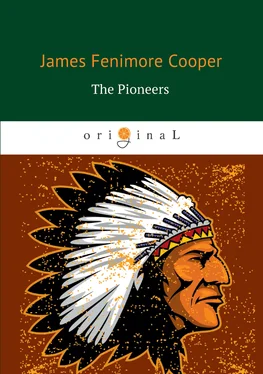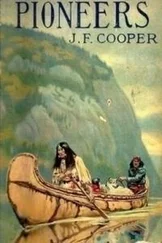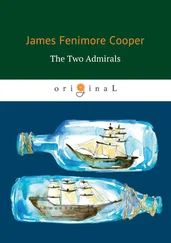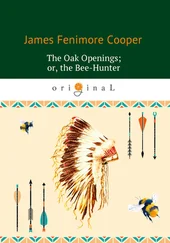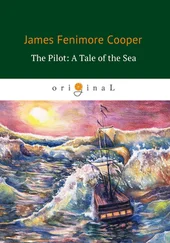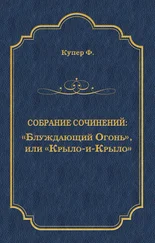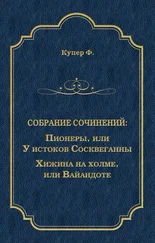“And, Natty”, said the youth eagerly, still holding the black by the arm. “I will just get the shot extracted, and bring you up to-night a quarter of the buck for the Christmas dinner.”
He was interrupted by the hunter, who held up his finger with an expressive gesture for silence. He then moved softly along the margin of the road, keeping his eyes steadfastly fixed on the branches of a pine. When he had obtained such a position as he wished, he stopped, and, cocking his rifle, threw one leg far behind him, and stretching his left arm to its utmost extent along the barrel of his piece, he began slowly to raise its muzzle in a line with the straight trunk of the tree. The eyes of the group in the sleigh naturally preceded the movement of the rifle, and they soon discovered the object of Natty’s aim. On a small dead branch of the pine, which, at the distance of seventy feet from the ground, shot out horizontally, immediately beneath the living members of the tree, sat a bird, that in the vulgar language of the country was indiscriminately called a pheasant or a partridge. In size, it was but little smaller than a common barn-yard fowl. The baying of the dogs, and the conversation that had passed near the root of the tree on which it was perched, had alarmed the bird, which was now drawn up near the body of the pine, with a head and neck so erect as to form nearly a straight line with its legs. As soon as the rifle bore on the victim, Natty drew his trigger, and the partridge fell from its height with a force that buried it in the snow.
“Lie down, you old villain”, exclaimed Leather-Stocking, shaking his ramrod at Hector as he bounded toward the foot of the tree, “ lie down, I say.” The dog obeyed, and Natty proceeded with great rapidity, though with the nicest accuracy, to reload his piece. When this was ended, he took up his game, and, showing it to the party without a head, he cried: “ Here is a tidbit for an old man’s Christmas – never mind the venison, boy, and remember Indian John; his yarbs are better than all the foreign ‘intments. Here, Judge”, holding up the bird again, “do you think a smooth-bore would pick game off their roost, and not ruffle a feather?” The old man gave another of his remarkable laughs, which partook so largely of exultation, mirth, and irony, and, shaking his head, he turned, with his rifle at a trail, and moved into the forest with steps that were between a walk and a trot. At each movement he made his body lowered several inches, his knees yielding with an inclination inward; but, as the sleigh turned at a bend in the road, the youth cast his eyes in quest of his old companion, and he saw that he was already nearly concealed by the trunks of the tree; while his dogs were following quietly in his footsteps, occasionally scenting the deer track, that they seemed to know instinctively was now of no further use to them. Another jerk was given to the sleigh, and Leather-Stocking was hid from view.
All places that the eye of heaven visits
Are to a wise man ports and happy havens:
Think not the king did banish thee:
But thou the king.
– Richard II
An ancestor of Marmaduke Temple had, about one hundred and twenty years before the commencement of our tale, come to the colony of Pennsylvania, a friend and co-religionist of its great patron. Old Marmaduke, for this formidable prenomen was a kind of appellative to the race, brought with him, to that asylum of the persecuted an abundance of the good things of this life. He became the master of many thousands of acres of uninhabited territory, and the supporter of many a score of dependents. He lived greatly respected for his piety, and not a little distinguished as a sectary; was intrusted by his associates with many important political stations; and died just in time to escape the knowledge of his own poverty. It was his lot to share the fortune of most of those who brought wealth with them into the new settlements of the middle colonies.
The consequence of an emigrant into these provinces was generally to be ascertained by the number of his white servants or dependents, and the nature of the public situations that he held. Taking this rule as a guide, the ancestor of our Judge must have been a man of no little note.
It is, however, a subject of curious inquiry at the present day, to look into the brief records of that early period, and observe how regular, and with few exceptions how inevitable, were the gradations, on the one hand, of the masters to poverty, and on the other, of their servants to wealth. Accustomed to ease, and unequal to the struggles incident to an infant society, the affluent emigrant was barely enabled to maintain his own rank by the weight of his personal superiority and acquirements; but, the moment that his head was laid in the grave, his indolent and comparatively uneducated offspring were compelled to yield precedency to the more active energies of a class whose exertions had been stimulated by necessity. This is a very common course of things, even in the present state of the Union; but it was peculiarly the fortunes of the two extremes of society, in the peaceful and unenterprising colonies of Pennsylvania and New Jersey,
The posterity of Marmaduke did not escape the common lot of those who depend rather on their hereditary possessions than on their own powers; and in the third generation they had descended to a point below which, in this happy country, it is barely possible for honesty, intellect and sobriety to fall. The same pride of family that had, by its self-satisfied indolence, conduced to aid their fail, now became a principle to stimulate them to endeavor to rise again. The feeling, from being morbid, was changed to a healthful and active desire to emulate the character, the condition, and, peradventure, the wealth of their ancestors also. It was the father of our new acquaintance, the Judge, who first began to reascend in the scale of society; and in this undertaking he was not a little assisted by a marriage, which aided in furnishing the means of educating his only son in a rather better manner than the low state of the common schools of Pennsylvania could promise; or than had been the practice in the family for the two or three preceding generations.
At the school where the reviving prosperity of his father was enabled to maintain him, young Marmaduke formed an intimacy with a youth whose years were about equal to his own. This was a fortunate connection for our Judge, and paved the way to most of his future elevation in life.
There was not only great wealth but high court interest among the connections of Edward Effingham. They were one of the few families then resident in the colonies who thought it a degradation to its members to descend to the pursuits of commerce; and who never emerged from the privacy of domestic life unless to preside in the councils of the colony or to bear arms in her defense. The latter had from youth been the only employment of Edward’s father. Military rank under the crown of Great Britain was attained with much longer probation, and by much more toilsome services, sixty years ago than at the present time. Years were passed without murmuring, in the sub ordinate grades of the service; and those soldiers who were stationed in the colonies felt, when they obtained the command of a company, that they were entitled to receive the greatest deference from the peaceful occupants of the soil. Any one of our readers who has occasion to cross the Niagara may easily observe not only the self importance, but the real estimation enjoyed by the hum blest representative of the crown, even in that polar region of royal sunshine. Such, and at no very distant period, was the respect paid to the military in these States, where now, happily, no symbol of war is ever seen, unless at the free and tearless voice of their people. When, therefore, the father of Marmaduke’s friend, after forty years’ service, retired with the rank of major, maintaining in his domestic establishment a comparative splendor, he be came a man of the first consideration in his native colony which was that of New York. He had served with fidelity and courage, and having been, according to the custom of the provinces, intrusted with commands much superior to those to which he was entitled by rank, with reputation also. When Major Effingham yielded to the claims of age, he retired with dignity, refusing his half-pay or any other compensation for services that he felt he could no longer perform.
Читать дальше
